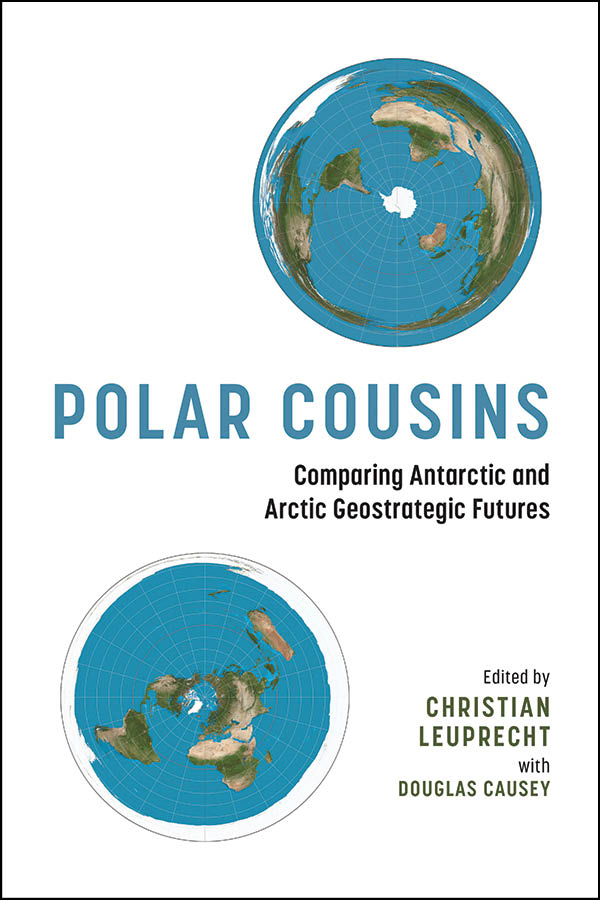
Polar Cousins: Comparing Antarctic and Arctic Geostrategic Futures
Edited by Christian Leuprecht with Douglas Causey
$39.99 PB / 64.99 HC (S)
220 pages
6 x 9 Inches
Hardback: 978-1-77385-437-3
Paperback: 978-1-77385-388-8
Epub: 978-1-77385-391-8
Library PDF: 978-1-77385-390-1
December 2022
A timely exploration of rapidly evolving geopolitical, social, and environmental challenges for national and international security strategy across the Arctic and Antarctic polar regions.
Geopolitics and climate change now have immediate consequences for national and international security interests across the Arctic and Antarctic. The world’s polar regions are contested and strategically central to geopolitical rivalry. At the same time, rapid political, social, and environmental change presents unprecedented challenges for governance, environmental protection, and maritime operations in the regions.
With chapters that raise awareness, address challenges, and inform policy options, Polar Cousins reviews the state of strategic thinking and options on Antarctica and the Southern Oceans in light of experience in the circumpolar North. Prioritizing strategic issues, it provides an essential discussion of geostrategic thinking, strategic policy, and strategy development.
Featuring contributions from international defence experts, scientists, academics, policymakers, and decisionmakers, Polar Cousins offers key insights into the challenges unique to the polar regions.
With Contributions By: Brenda Dunkle, Roger Bradbury, Joe Burton, Douglas Causey, Lassi Heininen, Randy “Church” Kee, Ilan Kelman, Timo Koivurova, Peter Layton, Christian Leuprecht, Dwayne Ryan Menzes, Heather Nicol, AJ (Tony) Press, Joanna Vince, and Robin Warner
Christian Leuprecht is Class of 1965 Professor in Leadership at the Royal Military College of Canada, editor-in-chief of the Canadian Military Journal, director of the Institute of Intergovernmental Relations in the School of Policy Studies at Queen’s University, and adjunct research professor at the Australian Graduate School of Policing and Security.
Douglas Causey is is professor of Biological Sciences at the University of Alaska Anchorage, faculty affiliate of the Harvard Kennedy School’s Belfer Center Arctic Initiative, and global fellow of the Wilson Center’s Polar Institute. An ecologist and evolutionary biologist by training, he has authored over two hundred publications on the environmental correlates of Arctic climate change, and he and his students are actively conducting research in Alaska, Bering Sea, and Northwestern Greenland. He has published extensively on policy issues related to the Arctic environment, Arctic environmental security, and bioterrorism and public health.
Acknowledgements
Introduction
Christian Leuprecht, Douglas Causey, Roger Bradbury, and Heather Nicol
Part 1
Prologue: Arctic Polar Security
Randy “Church” Kee
1. Polar Environmental Security: Challenges, Threats, and Realities
Douglas Causey, Randy “Church” Kee, and Brenda Dunkle
2. The Evolving Geopolitics of Polar Regions
Heather N. Nicol and Lassi K. Heininen
3. Polar Disaster Diplomacy: Geostrategies for Norway
Ilan Kelman
4. The Case for a Five Eyes Critical Minerals Alliance Focusing on Greenland
Dwayne Ryan Menezes
Part II
Prologue: A Southern Perspective
A. J. (Tony) Press
5. Challenges and Opportunities for Southern Ocean and Antarctic Governance
Joanna Vince
6. Australia’s East Antarctic Geostrategic Futures: Nirvana or Doom Inbound?
Peter Layton
7. Antarctic Environmental Security: Status and Challenges
Robin Warner
8. New Zealand’s Foreign and Security Policy in Antarctica: Small States, Shelter Seeking, and the Changing Polar Landscape
Joe Burton
Part III
Polar Coda
Heather Nicol, Timo Koivurova, and Douglas Causey
Contributors
Index
Seeks to push the conversation beyond uncertainty, fear, and chaos, towards a meticulous analysis of strategies to face these times of climate change and security crisis . . . provides a timely comparison of the two poles and highlights essential topics for the future of both regions.
—Anna Soer, H-Net Reviews
Critically important and unreservedly recommended addition to personal, professional, college, and university library collections.
—Midwest Book Review
The geopolitics of the polar regions are rapidly evolving, and this book provides critical insights and a contextual foundation into the similarities and differences of the Northern and Southern Polar regions, as well as their connections to, and impacts on the rest of the world.
—Mike Sfraga, chair, United States Arctic Research Commission, founding director, chair, and distinguished fellow, Polar Institute, Wilson Centre
Polar regions are increasingly strategically important. Polar Cousins provides relevant, timely information and historical examples to contrast the geostrategic significance of the Arctic and Antarctic helping the reader understand the two poles, and how and why they matter.
—Frances Ulmer, Former Lieutenant Governor of Alaska and Former Chancellor of the University of Alaska Anchorage
Polar Cousins is an expansive, innovative, fascinating and multi-disciplinary comparative study, examining the state of the Arctic and Antarctic – all at a time of heightened environmental, great power and governance challenges. It introduces fresh scholarship, comparing the circumstances at the two poles, addressing strategic competition, contrasting history and geography, territorial issues, geo-politics, military threats, trade and economic challenges, environmental and ecological concerns and legal perspectives. This is a must read for environmental, security, economic and foreign policy makers, notably including claimant and resident states such as the USA, UK, Canada, Australia and New Zealand.
—Professor John Blaxland, Australian National University, former Head, Strategic and Defence Studies Centre
Introduction - Christian Leuprecht, Douglas Causey, Roger Bradbury, and Heather Nicol
The Evolving Geopolitics of Polar Regions - Heather N. Nicol and Lassi K. Heininen
Polar Disaster Diplomacy: Geostrategies for Norway - Ilan Kelman
Challenges and Opportunities for Southern Ocean and Antarctic Governance - Joanna Vince
Australia's East Arctic Geostrategic Futures: Nirvana or Doom Inbound? - Peter Layton
Antarctic Environmental Security: Status and Challenges - Robin Warner
Polar Coda - Heather Nicol, Timo Kivurova, and Douglas Causey